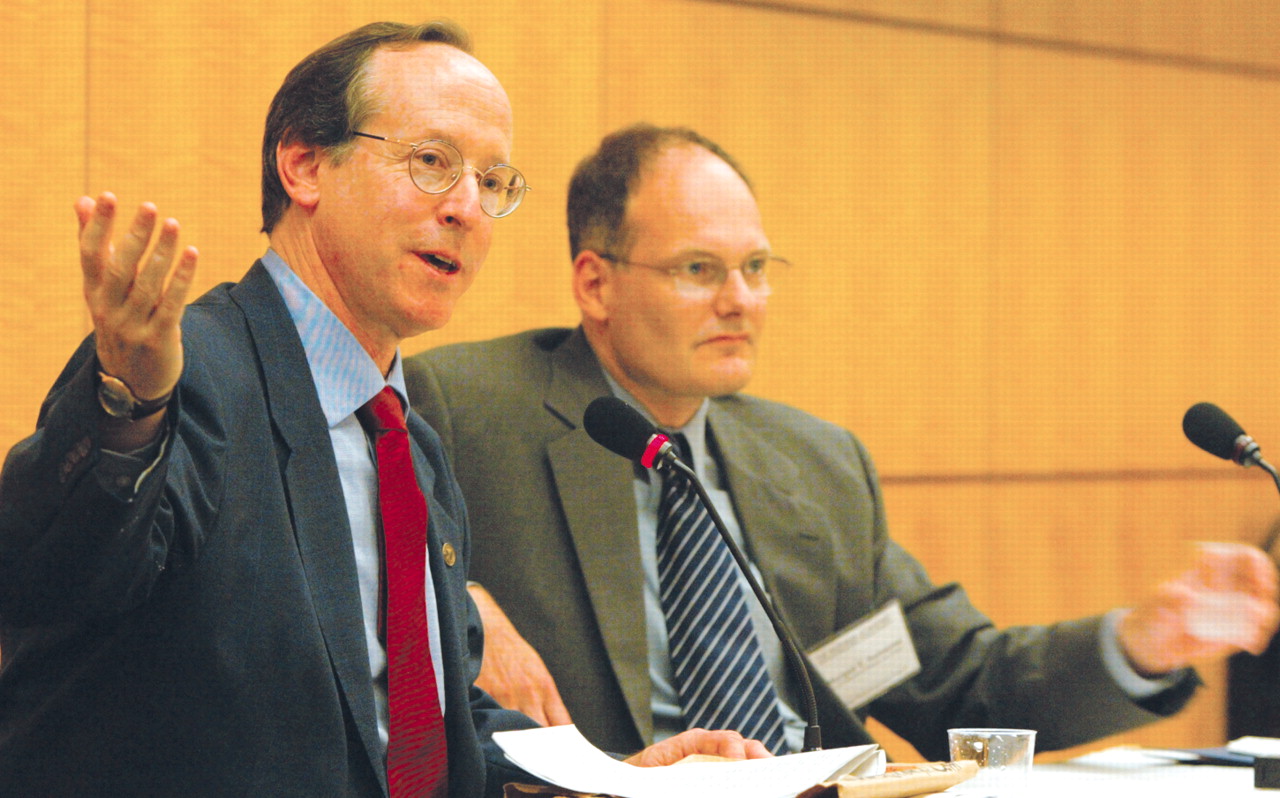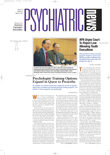In keeping with its mission to “bring together experts in all areas of science and technology to address critical national issues,” the National Academy of Sciences last month sponsored the debate “A Bitter Pill: Should Psychologists Have Prescriptive Privileges?”
The debate featured Eric Steckler, M.D., president of the Northern Virginia chapter of the Washington Psychiatric Society on behalf of APA, and Cmdr. Morgan Sammons, deputy director for clinical operations at the U.S. Navy Bureau of Medicine and Surgery. Sammons is a doctoral-level psychologist on active duty in the Naval Medical Corps. He noted he was speaking on behalf of the American Psychological Association as a private citizen, not in his capacity as a naval officer.
Speaking first, Sammons, a graduate of the first class of the Department of Defense's Psychopharmacology Demonstration Project—a pilot project begun in 1988 to train psychologists to prescribe—characterized the issue as“ part of an enormous transformation of our health care system.”
The move to grant psychologists prescriptive authority, Sammons said,“ takes place in the context of a vast transformation in American health care, an extraordinary rate of change in the scope of practice of any nonphysician provider.”
Sammons went on to note that “our mental health system, as Dr. Steckler will talk about in a few moments, is so badly broken. We believe that prescriptive authority will help to rectify this really tragic situation for many Americans.”
Sammons suggested that prescribing psychologists would be better equipped to offer integrated and comprehensive care combining the best psychological interventions with pharmacotherapy. Sammons added that he believes psychiatrists are mourning the loss of their ability to provide psychotherapeutic interventions in today's managed care environment of mandated med checks.
Sammons detailed the highlights of the American Psychological Association's model curriculum for training psychologists to prescribe and the requirements of the New Mexico and Louisiana statutes. Sammons is on the faculty of at least three institutions offering psychopharmacology training programs designed to meet these requirements (see related article on
page 1).
At one point in his remarks, Sammons suggested that prescribing psychologists would give superior care to patients compared with primary care physicians, noting that primary care physicians write the majority of prescriptions today for antidepressants, while providing little or no psychosocial intervention.
“It used to be just antidepressants,” Sammons argued,“ but now many pharmaceutical firms market their antipsychotics to primary care physicians, and I think at least one area where we can reach some common ground is that we don't believe that this is the most effective use of these medications for complex and severe, persistent mental disorders.”
Sammons finished his allotted time by declaring that “the patient-safety argument just isn't an issue.” He emphasized, “If any nonphysician health care provider with prescriptive authority was harming patients, you can bet they would be stopped immediately.”
Steckler, a child and adolescent psychiatrist in private practice in McLean, Va., met Sammons head on by first noting that he doesn't know any psychiatrists in mourning for psychotherapy.
“I do therapy in my office every day,” Steckler said,“ and just about everyone I know does.” He agreed with Sammons that the system is, indeed, badly broken. But the solution is not to grant a legal right to prescribe to individuals “ill prepared to accept the responsibility.”
Steckler detailed the very different pathways leading to prescribing privileges for physicians compared with those contained in the two state laws allowing psychologists to prescribe.
“A psychiatrist has nine years of biomedical education under his or her belt,” Steckler emphasized. “A psychologist may have a great deal of psychosocial and behavioral education, but would need only one year of biomedical education to meet the requirements in New Mexico or Louisiana.”
Psychologists, Steckler added, have provided great contributions and advances to the treatment of mental illness, including effective psychosocial interventions and tools that greatly aid the diagnosis and ongoing assessment of patients. But giving psychologists prescriptive authority is not the answer to increasing access to mental health care, Steckler said.
“Psychologists are no more likely to practice in underserved areas than psychiatrists,” he said. “We all practice in the same areas now, just down the street from each other. That isn't going to change.”
Granting prescribing privileges to psychologists will lead only to a decrease in the quality of care and raise significant patient safety issues, he said.
Steckler's arguments became more pointed during the question-and-answer period following the two speakers' presentations.
In response to a question from the audience asking Sammons whether he could describe a patient that he would be uncomfortable treating, he replied that he would not treat a patient who presented with serotonin syndrome in his office; he would refer the person. The questioner then asked Steckler how he would deal with a patient with serotonin syndrome.
“I'd continue to treat [the patient],” Steckler replied, adding he would watch the patient and make any necessary adjustments in medication.
Sammons interjected, “What if [the patient had] a severe or complicated [case of] serotonin syndrome?,” appearing surprised that Steckler would adopt such a “watch and wait” stance.
“My patients wouldn't be in that position in the first place,” Steckler concluded. ▪

